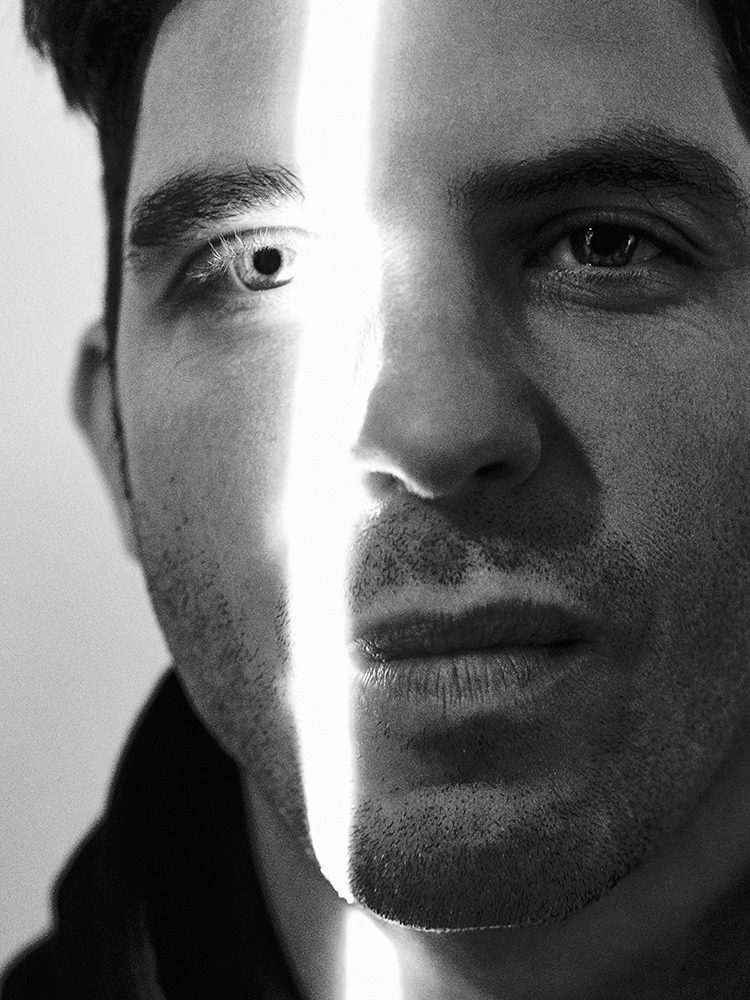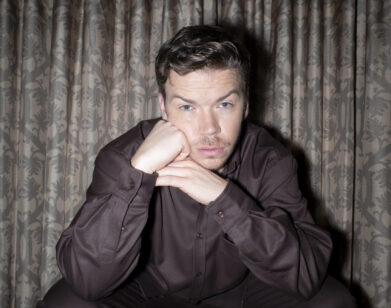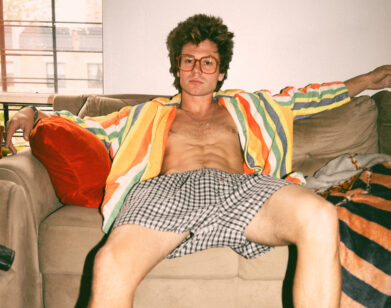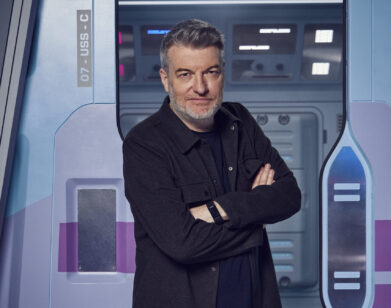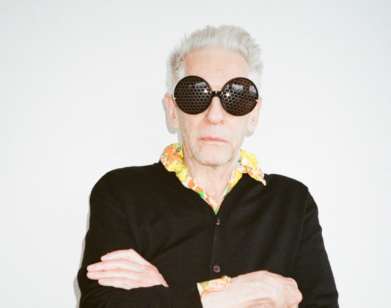Jonathan Levine
JONATHAN LEVINE IN NEW YORK, MARCH 2017. PHOTOS: DEAN PODMORE. STYLING: RIKA WATANABE. GROOMING: MICHAEL CHUA USING USING CAUDALIE AND FAT BOY HAIR.
“Having a movie come out is the worst part of making a film,” says director, writer, and producer Jonathan Levine over the phone from his home in Los Angeles. His child in sleeping in the next room, and his dog, Louis, occasionally interrupts with a bark. “It is the most anxiety-ridden part of the process,” he continues. “It’s not anticlimactic at all—it’s kind of what it’s all about, but that doesn’t make it easier.”
We’re talking shortly before Snatched, Levine’s latest film, comes out across the U.S. Written by Ghostbusters screenwriter Katie Dippold and starring Goldie Hawn and Amy Schumer as a mismatched mother-daughter pair, it marks Levine’s sixth feature as a director. His last film, which he also co-wrote, was the wildly funny, slightly stoner, A Christmas Carol comedy The Night Before (2015), and he’s built a commercial and critical reputation with movies like The Wackness (2008) and 50/50 (2011). Still, the New York native says he finds the release process “an incredibly intense experience.”
But Levine has little to worry about. He’s about to start working on his next feature, Flarsky, another Evan Goldberg and Seth Rogen production starring Charlize Theron, and at the beginning of next month, the pilot he directed for I’m Dying Up Here, David Flebotte’s new drama about a group of struggling comedians in 1970s L.A., will premiere on Showtime. “I had been such a huge fan of comedy, going back to when I was a kid, renting VHS tapes of Robin Williams and George Carlin and hearing all the lore of the Comedy Store in the ’70s,” he says of the show, which stars real-life standup comedians, as well as established actors like Melissa Leo, Ari Graynor, Alfred Molina, and up-and-comers like RJ Cyler. “It’s about comedians, so people who are fucked-up, depressed, and driven. It was this great opportunity to have comedy, but mixed with something that was a very serious exploration of the comedic mind.”
EMMA BROWN: I know you worked for Paul Schrader when you were in your early 20s. Was that your first job in film?
JONATHAN LEVINE: It actually was. I was Paul Schrader’s assistant. I worked at the Paramount building in New York. I was a terrible assistant. He had an amazing library of old movies on VHS that I would watch when I was supposed to be working. He was an incredible person to be around, and someone I completely idealize. It was really an amazing entry into the world of film.
BROWN: How did you get the job?
LEVINE: My girlfriend at the time was Philip Seymour Hoffman’s assistant, and so she tapped into that world and told me there was a job opening. I have no idea why he hired me, but he did.
BROWN: How were you a bad assistant?
LEVINE: I was 23 in New York, so I would often come in hungover, probably reeking of booze. Schrader, as much as in the ’70s I think he was one of those wild auteurs, was not at that point in his life. He was a very disciplined, working writer-director. I remember one time, he was like, “Send this script to Warren Beatty,” which is a big deal—he wants Warren Beatty to act in this movie. So I printed out the script, sent it, and then the next day learned that I’d forgotten to include the last page of the script. That was probably my biggest fuck up.
BROWN: Were you already planning to go to film school?
LEVINE: No, but I had always wanted to be a director. Film school came up halfway into when I was working for Paul. He’d actually gone to AFI, which is where I went. So I applied to a bunch of film schools. I think that was actually the only one I got into, but it turned out to be a great choice and it really, really launched my career.
BROWN: Did you have another job between graduating and working for Paul?
LEVINE: Right after college, right before the internet bubble burst, I was working as a “solutions partner” at a web consulting firm. Another job where I had no idea what to do, or even what I was supposed to be doing. I think my first day on the job, they laid-off half the company. I’d just put down a year’s rent on an apartment in the East Village, so I hid there for about a year until they ultimately realized I wasn’t doing anything.
BROWN: How did you get involved with Snatched?
LEVINE: Katie [Dippold] had written this really wonderful script, and Paul [Feig] was producing it. I think Paul was going to direct it at some point, and then he went off to do Ghostbusters. I had just finished The Night Before, and I was a big fan of Katie’s writing and of Amy’s, and she was attached. I just really fell for it. Then I met with Amy in New York and I wrote her a long letter about what the movie meant to me, and what the script meant to me, and we agreed to do it together.
BROWN: What did the movie mean to you?
LEVINE: I had just had my baby, and it had gotten me thinking about the relationship between myself and my own parents, and how you assume your parents’ lives are over to a certain extent when they have kids. You really don’t think of your parents as human beings. That was the context within which I was reading it. I was like, “I’m a parent. I’m a human being still. I want to live!”
BROWN: Did you tell your parents about this revelation?
LEVINE: No. You would think I would have, but I kept it to myself and just put it into the movie. [laughs] I did watch the movie with my mom, and I think that she appreciated the sentiment as she was watching it.
BROWN: Before Snatched, Goldie Hawn hadn’t done a film in 15 years. When did her name come up, and what made you think she might be interested in doing a movie at all?
LEVINE: Amy was pitching her from the beginning, and I didn’t know, really. I was a huge Goldie Hawn fan, as so many people are, but I didn’t know if she would want to do it, or why she hadn’t worked. Amy had met Goldie in the months after Trainwreck, and they had a mutual respect and admiration for each other. We all sat down together in L.A., and I just was taken with Goldie, as anyone would be when you meet her. Not just because of her filmography and screen presence, but because she’s an amazing person. She’s so fun.
BROWN: As a director, do you have a different relationship to a script that you wrote versus one that someone else wrote?
LEVINE: You have a similar relationship. When you didn’t write the script, there’s a degree of objectivity that you can bring to it. A lot of times when I’m writing, if something doesn’t work, it’s harder for me to diagnose. That’s why I like going back and forth between the two. When I’m writing something, by the time I’m done making it, I’m so sick of my own writing that I’m like, “Someone else has got to be better at this than me.” So I find a great script from an amazing writer like Katie. Now that I’m done with this, I’m getting more warmed up to my own writing. It’s this constant back-and-forth, but the approach is still the same. You’re still trying to hone it and make it as funny as possible, as heartwarming as possible. It’s just sometimes a little easier when you haven’t written it and you have this amazing brain trust between Katie and Amy Schumer and her sister Kim [Caramele].
BROWN: When you’ve written something, do you feel like you have all the answers?
LEVINE: I never feel like I have all the answers. I feel like the process of making movies is a process of so many people finding answers together. When I’ve written something, when it’s part of your own DNA, I can go with my gut a little bit more. I’m more comfortable coming up with an answer—whether that be the right one or not, I don’t know.
BROWN: I also wanted to talk about I’m Dying Up Here, which I loved. You directed the pilot. Is it hard to say goodbye to everyone after just one episode?
LEVINE: It really is. We put together this wonderful family. When you’re making a pilot, especially about a group of comedians like this, you build a rapport, and it’s about conveying the effortless nature of hanging out and staying up late and going to Canters [Deli in L.A.] and talking shit. All the actors took it pretty seriously, building this family, so it’s really hard when you do have to break that up. Then I went off and did Snatched, and it was hard to know that they were under the wing of a different director. I missed everyone. But I still stay in touch with a lot of those guys.
BROWN: Television actors sometimes talk about how weird it can be working with different directors for each episode. The director will come in and they won’t know what everyone’s been doing, or how they’ve been doing it. Would you ever direct an third episode, for example, or did you purposefully only do the pilot? Is that something you’ve thought about or dealt with?
LEVINE: When you come from film, doing a pilot is a lot easier because you have a little bit more time and you can really execute it in a more cinematic way. Doing an episode is really, really tricky. The people who come in and do episodes, that’s an amazing skill set that they have. But I want to do it for I’m Dying Up Here because I have shorthand with all those actors. I did do an episode of a TV show once, and I really hated the experience. It’s like going into high school and all the kids know each other, and you’re the new kid and you’re supposed to tell everyone what to do. It’s a very strange feeling dropping into that social dynamic. So much of directing is about having a high social IQ and reading various social cues. When you don’t have that, I don’t think you can be as good at your job—at least for me.
BROWN: Do you feel like you’re pretty socially aware outside of work?
LEVINE: [laughs] I do. Maybe hyper-aware. Maybe neurotic and paranoid. But it comes in handy sometimes. I’m socially aware maybe up until, let’s say, three glasses of wine.
BROWN: As the director of the pilot, how involved were you in the casting process for I’m Dying Up Here?
LEVINE: We were all very involved in it. We went to comedy clubs in L.A., we poured through tapes of actors. There were people that I knew from working in the world of comedy; people that [the creator] Dave [Flebotte] knew from working in television. Everyone brought an idea to the table. It was not necessarily always a democratic way of figuring it out. Sometimes someone would come in and I would say to Dave, “As written, that’s not who that person is on the page.” And Dave was like, “I don’t care. That guy is so funny that we can change what’s on the page.” When you’re directing a pilot, you’re trying to execute the vision of the writer; TV is a writer’s medium. At the same time, what was great about Dave was he had the flexibility to approach it as a tapestry. Though it certainly is a drama, it was, “Let’s find really funny people. Let’s find people with amazing acting chops. Let’s find standups who can act, and actors who can do standup.” Once we zoomed out, we ended up with this incredibly eclectic cast.
SNATCHED IS OUT NOW. I’M DYING UP HERE PREMIERES JUNE 4, 2017 ON SHOWTIME.

